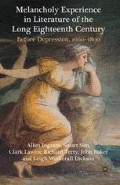Abstract
As Leigh Wetherall-Dickson has shown in the previous chapter, coming to terms with oneself, especially through the medium of language, even within a private context, is a hazardous and painstaking enterprise, and one that is by no means guaranteed to end successfully. For those whose sense of self is clouded by doubts, self-recriminations and recurrent feelings of unworthiness, the process can involve an agonizingly long series of negotiations for which life itself, perhaps, provides insufficient time. This chapter seeks to place the quest for that elusive core of the depressive identity in terms of medical change, both the changes in medical practice between the eighteenth century and our own period, and also the changes in response that different medical approaches seem to have met with from patients then and now. This leads to the key question, both in this book and in terms of society’s attitudes towards its depressed individuals: how far were, and are, medical responses actually helping the ‘troubled in mind’, and how far were, and are, they actually contributing to the problem.
Access this chapter
Tax calculation will be finalised at checkout
Purchases are for personal use only
Preview
Unable to display preview. Download preview PDF.
Notes
Richard Bentall, Doctoring the Mind: Why Psychiatric Treatments Fail ( London: Allen Lane, 2009 ), pp. 111–12.
Daniel Freeman, ‘Health in Mind’, The Guardian (25 July 2009), p. 6.
Sally Vickers, ‘See a psychiatrist? Are you mad?,’ The Observer (21 June 2009), p. 19.
Bryan Appleyard, ‘Have we lost all reason?’, Sunday Times (5 July 2009), ‘Culture’, p. 45.
James Boswell, Boswell’s Column, 1777–1783, ed. Margery Bailey ( London: William Kimber, 1951 ), p. 209.
Michael B. First, Robert L. Spitzer, Miriam Gibbon and Janet B. W. Williams, Structures Clinical Interview for DSM—IV Axis I Disorders—Clinician Version (SCID—CV) ( Washington DC: American Psychiatric Press, 1997 ), pp. 2–4.
Lewis Wolpert, Malignant Sadness: The Anatomy of Depression, 3rd edn ( London: Faber and Faber, 2006 ), p. 139.
William Styron, Darkness Visible: A Memoir of Madness (London: Jonathan Cape, 1991; repr. London: Vintage, 2001 ), p. 51.
John F. Sena, ‘The English Malady: The Idea of Melancholy from 1700–1760’, PhD thesis (Princeton University, 1967 ), p. 64.
John Woodward, Select Cases, and Consultations, in Physick ( London: The Royal Society, 1757 ), p. 31.
George Cheyne, The English Malady: or, A Treatise of Nervous Diseases of all Kinds (London: G. Strahan and J. Leake, 1733), pp. 134, 136.
Sir Richard Blackmore, A Treatise of the Spleen and Vapours: or, Hypochondriacal and Hysterical Affections ( London: J. Pemberton, 1726 ), p. 167.
George Young, A Treatise on Opium, Founded upon Practical Observations ( London: A. Millar, 1753 ), pp. 101–8.
John Birch, A Letter to Mr. George Adams, on the Subject of Medical Electricity (London, for the author, 1792), pp. 5–6.
George Trosse, The Life of the Reverend Mr. George Trosse [1714], ed. A. W. Brink ( Montreal: McGill-Queen’s University Press, 1974 ), p. 96.
Michelle Faubert, Rhyming Reason: The Poetry of Romantic-Era Psychologists ( London: Pickering and Chatto, 2009 ), p. 47.
William Cowper, Memoir of the Early Life of William Cowper, Esq. [1816], in Dale Peterson (ed.), A Mad People’s History ofMadness (Pittsburgh: University of Pittsburgh Press, 1982), pp. 65–73, p. 69.
William Law, A Serious Call to a Devout and Holy Life (London: William Innys, 1729), p. 483. I am grateful to Diane Buie for alerting me to this passage.
Peter Shaw, The Juice of the Grape: or, Wine Preferable to Water ( London: W. Lewis, 1724 ), p. 43.
Lewis Carroll, Alice’s Adventures in Wonderland… [1865] (London: Nonesuch Press, 1963 ), p. 27.
Samuel Tuke, Description of The Retreat, An Institution Near York [1813], ed. Richard Hunter and Ida MacAlpine (London: Dawsons, 1964 ), pp. 151–2.
N. D. Jewson, ‘The Disappearance of the Sick-Man from Medical Cosmology, 1770–1870’, Sociology, 10 (1976), pp. 225–44, p. 229.
Peter Shaw, The Reflector: Representing Human Affairs, As they are; and may be improved ( London: T. Longman, 1750 ), p. 227.
Kay Redfield Jamison, An Unquiet Mind: A Memoir of Moods and Madness ( New York: Alfred A. Knopf, 1995 ), pp. 88–9.
Copyright information
© 2011 Allan Ingram, Stuart Sim, Clark Lawlor, Richard Terry, John Baker, Leigh Wetherall-Dickson
About this chapter
Cite this chapter
Ingram, A. (2011). Deciphering Difference: A Study in Medical Literacy. In: Melancholy Experience in Literature of the Long Eighteenth Century. Palgrave Macmillan, London. https://doi.org/10.1057/9780230306592_7
Download citation
DOI: https://doi.org/10.1057/9780230306592_7
Publisher Name: Palgrave Macmillan, London
Print ISBN: 978-1-349-31949-7
Online ISBN: 978-0-230-30659-2
eBook Packages: Palgrave Literature CollectionLiterature, Cultural and Media Studies (R0)

